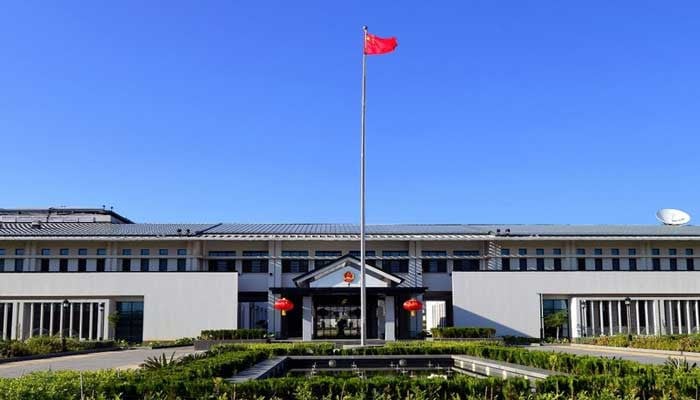
Are China- Pakistan Relations Cooling Off?

View of the Chinese Embassy in Islamabad
‘All-weather friendship that is higher than mountains, deeper than oceans, stronger than steel and sweeter than honey’ is the rhetoric in China-Pakistan relations that has been worn threadbare by constancy of usage! There are dichotomies and contradictions that are with regularity highlighted. To follow it from 1951, the relationship has been based on expediency and geopolitical considerations, between two gross unequals. The growth of this relationship saw Pakistan’s border treaty in 1963 handing over Shaksgam Valley to China, to 1966 to construct the Friendship or Karakoram Highway linking Xinjiang region with Gilgit-Baltistan, to seminal facilitation of the Kissinger visit to China in 1971. China’s first veto in the UNSC in 1972 was in Pakistan’s favour when Bangladesh’s admission was considered, conditional on the safe return of Pakistani prisoners of war from India.
Consequently, China and Pakistan established institutionalised mechanisms with agreement on civilian nuclear cooperation with nuclear power plants set up in Pakistan and landmark project on co-production of JF-17 fighter aircrafts. Both countries also commenced cooperation in the space technology. In language “friendly relations” changed to “traditional friendship”, to “comprehensive friendship” and “all weather friendship.” The 2005 Treaty of Friendship, Cooperation and Good Neighbourly Relations termed it as “bilateral strategic partnership of good-neighbourly friendship” and in July 2013, with launch of CPEC, it became the “China-Pakistan all-weather strategic cooperative partnership.” After the 19th Communist Party Congress in 2017, the relationship turned to “China-Pakistan all-weather strategic cooperative partnership and building closer Pakistan-China community of shared future in the new era.” China is popular in Pakistan, as its ‘all weather ally,’ willing to invest in Pakistan, despite all its mishandlings. Military ties have been the mainstay of the China-Pakistan strategic partnership. The highest body for bilateral military cooperation is the Pakistan-China Joint Military Cooperation Committee (PCJMCC).
All is not hunky dory in the current trends in Pakistan-China relations, however. Strains are increasingly showing in what is supposed to be the “all weather” friendship between China and Pakistan. There are four larger reasons that indicate a marked change in the relationship. First is the ongoing political turmoil in Pakistan, a theatre of the absurd. Though China is least interested in the typology of Governments in its push to economically subjugate nations and obtain political influence, Pakistan is another matter. The sharp divisions between Imran Khan and Sharifs-Bhuttos combine, the Damocles Sword of elections, the dubious role of the judiciary and the all-important Army, and the general public unrest cause serious caution in China in further dealings with Pakistan establishment. Chinese Embassy in Pakistan, a critical country for China, did not even have an Ambassador from China in 2022.
Second, Pakistan was amongst the first countries to join the Belt and Road Initiative (BRI). As a pilot project of the BRI, the CPEC was the flagship of President Xi Jinping. The CPEC investment progressed slower than expected, especially the most important Gwadar port in Baluchistan. Some transport and energy infrastructure, badly needed in Pakistan, have been built. New power plants have added energy to Pakistan’s power grid. Roads and railways are being constructed. The ML-1 connection linking Karachi with the northern city of Peshawar is the most significant project under construction by Chinese companies.
During Pakistani Prime Minister Shehbaz Sharif’s two-day visit to China in November 2022, Beijing reiterated that relations with Islamabad will always be given the highest priority, reaffirming its support for Pakistan’s sovereignty, territorial integrity, security and development. The Chinese leadership also expressed appreciation for PM Sharif’s long-standing dedication to the China-Pakistan friendship. There was agreement on the “Importance of the China-Pakistan All-Weather Strategic Cooperative Partnership amidst the emerging global challenges.”
Pakistan was hoping for great positives due to CPEC in matters of employment, support to national economy, improved infrastructure, alleviation of the problems of power and water supply. All these hopes have been belied. PM Sharif’s visit to China was mainly focused on seeking to revive CPEC, which had faced mounting challenges. Pakistan is still prone to serious blackouts and outages. Although 28 projects worth $18.8 billion have so far been completed under CPEC over the past seven years, other projects worth $34 billion are in different phases of execution, planning or just stuck. The $10 billion Karachi Circular Railway, and energy generation projects worth $18.5 billion encountered serious delays. Not a single new CPEC scheme was initiated in last four years, with several projects suspended due to concerns of the Chinese.
The Chinese have stopped construction of power plants after the government failed to pay the dues to existing Chinese power producers. A sticking point remains roughly 300 billion rupees ($1.5 billion) in dues which Pakistan owes to Chinese power producers. Meanwhile, other Chinese companies operating in Gwadar are complaining about the high cost of using their own generators. Chinese companies have floated the idea of establishing a 50 MW power plant in Gwadar to meet the needs of the port and the Gwadar free zone — an area created to lure businesses with tax breaks. It would not solve the larger power programme. Some PTI leaders called for renegotiating several projects with the Chinese government, which irked Beijing. CPEC has become an albatross around Pakistan, cannot moved forward or get out of it!
Third, Is the issue of ethnic Baloch and Sindh separatists in last few years having launched a series of targeted attacks on Chinese citizens in Karachi and Balochistan. There was attack on the Chinese Karachi Consulate in November 2018 and the April suicide bombing on Confucius Institute. A bus carrying nine Chinese engineers working on a hydropower project was attacked in July 2021. The bus was carrying the workers to the Dasu Hydropower Project in Upper Kohistan, a region in Pakistan’s north western Khyber Pakhtunkhwa province. More than 450 Chinese engineers were working on the Dasu Hydropower Project. These attacks have created distrust between China and Pakistan.
After the Confucius Institute attack in April 2022, Chinese came up with a proposal to bring its security to guard Chinese citizens, and Pakistan turned the proposal down. All new Chinese investments remained retarded by Pakistan not agreeing to the proposal of allowing Chinese security firms in Pakistan. China has been eager to bring its own private security companies to guard its nationals working on CPEC-led projects in Pakistan. Pakistan is in little position to accept such demands from China. Allowing Chinese security companies to operate inside Pakistan would seriously compromise Pakistan Army’s claim to be powerful enough to tackle all threats to the country. This position, underlying the military’s self-styled image as the indispensable pillar of the nation, has provided crucial justification for outsized spending on defence and security.
Unimaginably, China has attempted to talk directly with ethnic Baloch parliamentarians to address their concerns, bypassing Pakistani authorities. In August 2022, the Chinese envoy to Pakistan, Nong Rong, held a series of one-to-one meetings in Islamabad with politicians from Balochistan to discuss Baloch nationalists’ grievances with China. Security to Chinese personnel is a grave issue, the one that is the major cause of concern in the progress of CPEC.
Fourth is the state of Pakistan economy and socio-economic condition. Pakistan is in the grip of an economic crisis that has seen foreign exchange reserves dwindle, fuel prices surge and prolonged blackouts occur. Many in Pakistan feel that Chinese investment has failed to trigger the level of economic growth that President Xi Jinping’s narrative of a win-win relationship had projected. While a consortium of Chinese state-owned banks in June 2022 opened a new $2.3 billion credit line for Pakistan, it is evident that Beijing’s key concern now is helping Islamabad avoid bankruptcy. An insolvent Pakistan would hurt Chinese business interests that run into the billions of dollars.
Pakistan economy is virtually tottering, which its Defence Minister having recently stated that they have already defaulted on international loans, and bankruptcy looms large. Forex reserves at sub-$3billion are very dire, recession a given and inflation is runaway, causing severe hardships. The IMF has laid down stringent conditionalities for next tranche of loan and the ADB, the Saudi Development Bank and China are all waiting on the margins! The lower income peoples are seeing a massive dent in purchasing power of 30% to 40% as most of their incomes are spent on food, energy, utilities and transportation.
And there is no apparent way out till Pakistan accepts the structural reforms being pushed in by IMF. The latter will cause grief to the ultra-rich in Pakistan including the all-powerful Pakistan Army. That China, with its deep-pockets, is not bailing out is understandable from the Chinese view-point of investing in a near basket-case, from the Pakistani prism it is being ditched mid-stream!
In sum, a cooling off between Pakistan and China is evident. Recently, Pakistan was not invited for the 18 emerging-market nations at the High-Level Dialogue on Global Development hosted by Beijing, with a virtual BRICS leaders’ summit due to Indian objections which China apparently made little effort to allay. What really binds China and Pakistan together is their mutual mistrust of India.
However, the ties that bind Pakistan and China are as much geopolitical as geoeconomic. The China Index 2022 explored China’s influence in 82 countries. Pakistan stood out as having maximum Chinese influence. Recently, the Chinese Foreign Ministry spokesperson said “No matter how the international landscape may evolve, the mutual trust and friendship between China and Pakistan will remain rock-solid. China will, as always, prioritise China-Pakistan relations in its neighbourhood diplomacy, and is ready to further strengthen policy communication and coordination of development strategies with Pakistan.” Hence, while there are issues, China is one of Pakistan’s most important strategic allies and partners that have helped Pakistan in the toughest of times. The collusion must not be under-played by policy-makers in India.
Disclaimer
The opinions expressed in this article are the author’s own and do not reflect the views of Chanakya Forum. All information provided in this article including timeliness, completeness, accuracy, suitability or validity of information referenced therein, is the sole responsibility of the author. www.chanakyaforum.com does not assume any responsibility for the same.
Chanakya Forum is now on . Click here to join our channel (@ChanakyaForum) and stay updated with the latest headlines and articles.
Important
We work round the clock to bring you the finest articles and updates from around the world. There is a team that works tirelessly to ensure that you have a seamless reading experience. But all this costs money. Please support us so that we keep doing what we do best. Happy Reading
Support Us





















POST COMMENTS (2)
Kalidan Singh
PATIAL RC